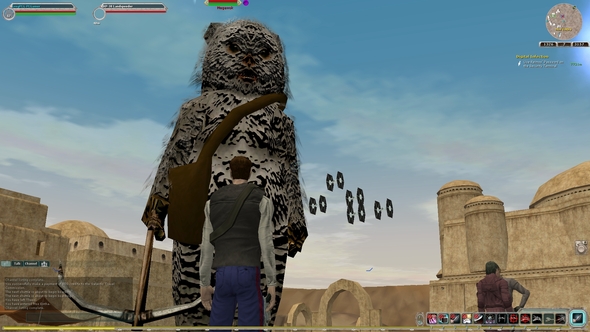On December 15th, 2011, humans and aliens alike banded together to celebrate, and mourn, the end of Star Wars: Galaxies. Sony Online Entertainment spread news of the final days and let the dev team go nuts. Fireworks blazed ahead over city scapes while colossal, Game Master controlled monsters battled with heroes in the streets as the final hours ticked down. Longtime fans came together with users who hadn’t touched the game in years to watch the universe crumble. It gave players one final chance to say farewell to the places they loved and friends they’d made in the eight and a half years since release. SoE finally pulled the plug at 12:01, ending Galaxies for good.
I have the Galaxies launch discs right here. I could pop them in my machine this very moment, and let it install every character model, every planet, and each feature the game launched with (barring patches, of course). But even if I did, I couldn’t play it. “The servers are down,” it would say. “Try again later.” My machine would send a drifting warble into the depths of space, a lonely cry that would never be answered.
The fate of SWG is sadly not uncommon with games these days, and it illustrates a problem unique to the medium.
 Games can straight up die. There is something beautiful about the death of a game, (especially in an MMO’s final few minutes of life, where colossal Ewoks rampage through Mos Eisley, kebabing rodians on a giant spear), but what exactly happens when a game dies? You are left with memories, and a couple of worthless discs. You can’t play these games again. They are forever lost in the sands of time. (Okay, so, that statement wasn’t one hundred percent factual. More on that later, I promise.) Their legacy shall be carried only by wide-eyed storytellers ‘round the bonfire, and on message boards where polarized opinions clash in horrific, yet fascinating, verbal battles.
Games can straight up die. There is something beautiful about the death of a game, (especially in an MMO’s final few minutes of life, where colossal Ewoks rampage through Mos Eisley, kebabing rodians on a giant spear), but what exactly happens when a game dies? You are left with memories, and a couple of worthless discs. You can’t play these games again. They are forever lost in the sands of time. (Okay, so, that statement wasn’t one hundred percent factual. More on that later, I promise.) Their legacy shall be carried only by wide-eyed storytellers ‘round the bonfire, and on message boards where polarized opinions clash in horrific, yet fascinating, verbal battles.
When a game is gone, you can’t share it anymore. You can’t come back to it years later and see if the contents aged well, or if your affection for the item was genuine or if you were just blinded by nostalgia. What’s more is that we lose a piece of the History of Video Games, denying a slice of our (very young) medium’s legacy. We should be able to preserve and cherish our history. It’s important to take a look back and see how far we’ve come, or to see what made games great years ago.
